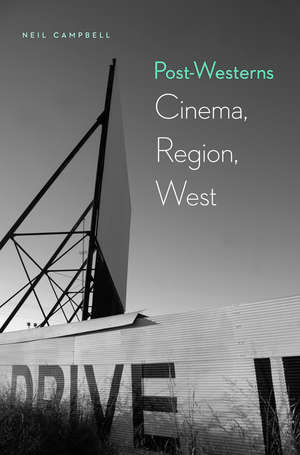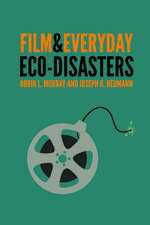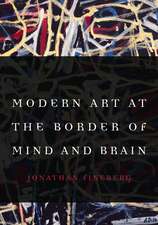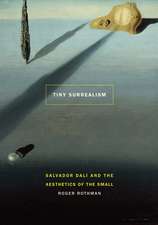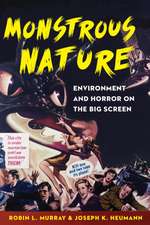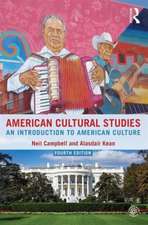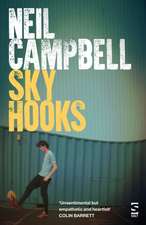Post-Westerns: Cinema, Region, West: Postwestern Horizons
Autor Neil Campbellen Limba Engleză Hardback – 30 sep 2013
Campbell suggests that post-Westerns are in fact “ghost-Westerns,” haunted by the earlier form’s devices and styles in ways that at once acknowledge and call into question the West, both as such and in its persistent ideological framing of the national identity and values.
Din seria Postwestern Horizons
-
 Preț: 117.96 lei
Preț: 117.96 lei -
 Preț: 115.06 lei
Preț: 115.06 lei -
 Preț: 400.71 lei
Preț: 400.71 lei -
 Preț: 357.49 lei
Preț: 357.49 lei -
 Preț: 201.85 lei
Preț: 201.85 lei -
 Preț: 217.14 lei
Preț: 217.14 lei -
 Preț: 158.97 lei
Preț: 158.97 lei -
 Preț: 217.62 lei
Preț: 217.62 lei -
 Preț: 254.97 lei
Preț: 254.97 lei -
 Preț: 292.05 lei
Preț: 292.05 lei -
 Preț: 217.90 lei
Preț: 217.90 lei -
 Preț: 428.75 lei
Preț: 428.75 lei -
 Preț: 398.03 lei
Preț: 398.03 lei -
 Preț: 259.38 lei
Preț: 259.38 lei -
 Preț: 211.16 lei
Preț: 211.16 lei -
 Preț: 428.53 lei
Preț: 428.53 lei -
 Preț: 177.94 lei
Preț: 177.94 lei -
 Preț: 513.54 lei
Preț: 513.54 lei -
 Preț: 217.31 lei
Preț: 217.31 lei -
 Preț: 219.64 lei
Preț: 219.64 lei -
 Preț: 255.74 lei
Preț: 255.74 lei -
 Preț: 223.66 lei
Preț: 223.66 lei -
 Preț: 184.36 lei
Preț: 184.36 lei -
 Preț: 185.13 lei
Preț: 185.13 lei
Preț: 502.82 lei
Nou
Puncte Express: 754
Preț estimativ în valută:
96.23€ • 104.49$ • 80.83£
96.23€ • 104.49$ • 80.83£
Carte tipărită la comandă
Livrare economică 22 aprilie-06 mai
Preluare comenzi: 021 569.72.76
Specificații
ISBN-13: 9780803234765
ISBN-10: 0803234767
Pagini: 432
Ilustrații: index
Dimensiuni: 152 x 229 x 32 mm
Greutate: 0.77 kg
Editura: Nebraska
Colecția University of Nebraska Press
Seria Postwestern Horizons
Locul publicării:United States
ISBN-10: 0803234767
Pagini: 432
Ilustrații: index
Dimensiuni: 152 x 229 x 32 mm
Greutate: 0.77 kg
Editura: Nebraska
Colecția University of Nebraska Press
Seria Postwestern Horizons
Locul publicării:United States
Notă biografică
Neil Campbell is professor of American studies and senior research fellow at the University of Derby, England. He is the author of The Rhizomatic West: Representing the West in the Global, Media Age (Nebraska, 2008) and the editor of, most recently, Photocinema: The Creative Edges of Photography and Film.
Cuprins
Acknowledgments
Introduction: Big Hats, Horses, and Dust: The Visible and Invisible West
1. Dead Westerns: The Posthumous and the Post-Western
2. Mourning in America: The Lusty Men (1952) and Bad Day at Black Rock (1954)
3. "You and Your God's Country": The Misfits (1961)
4. "We Keep Heading West": Dennis Hopper and the Post-Western
5. Exile and Dislocation in the Urban Post-Western: The Exiles (1961) and Fat City (1972)
6. Post-Western Genealogies: John Sayles's Lone Star (1996) and Silver City (2004)
7. "Opened from the Inside Out": Wim Wenders's Don't Come Knocking (2005)
8. The Idioms of Living: Donna Deitch and Allison Anders
9. The Schizo-West: Down in the Valley (2005)
10. Spook Country: The Pensive West of No Country for Old Men (2007)
Conclusion: Is There a Politics of the Post-Western?
Notes
Index
Introduction: Big Hats, Horses, and Dust: The Visible and Invisible West
1. Dead Westerns: The Posthumous and the Post-Western
2. Mourning in America: The Lusty Men (1952) and Bad Day at Black Rock (1954)
3. "You and Your God's Country": The Misfits (1961)
4. "We Keep Heading West": Dennis Hopper and the Post-Western
5. Exile and Dislocation in the Urban Post-Western: The Exiles (1961) and Fat City (1972)
6. Post-Western Genealogies: John Sayles's Lone Star (1996) and Silver City (2004)
7. "Opened from the Inside Out": Wim Wenders's Don't Come Knocking (2005)
8. The Idioms of Living: Donna Deitch and Allison Anders
9. The Schizo-West: Down in the Valley (2005)
10. Spook Country: The Pensive West of No Country for Old Men (2007)
Conclusion: Is There a Politics of the Post-Western?
Notes
Index
Recenzii
"Readers of western history and literature and, of course, fans of the Western will find Campbell's insights and interpretations a compelling reason to revisit the post-Westerns he analyzes so well."—Leonard Engel, Western Historical Quarterly
"This is the work of a mature, well-informed scholar very much at the top of his game."—James F. Scott, Western American Literature
“Post-Westerns is distinguished by its theoretical sophistication, its brilliant close readings of the form and content of a diversity of modern and contemporary films, and its close meditation on the potential politics associated with such films [as they] address the intersection of memory, identity, and history.”—Stephen Tatum, author of In the Remington Moment
